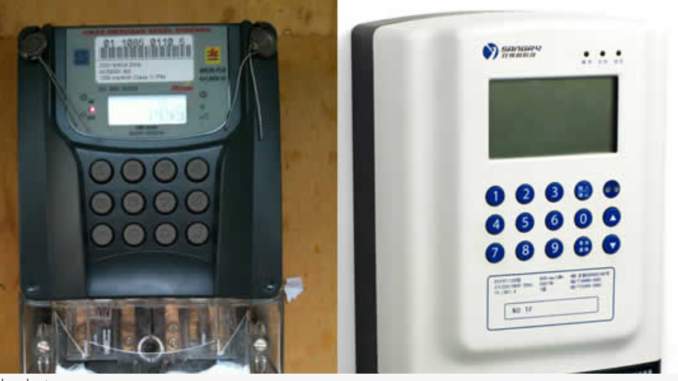
THE vexed issue of lack of meters for electricity consumers re-echoed last week when Kaduna Electricity Distribution Plc contracted three companies to provide 200,000 pre-paid meters for its customers. The initiative should jolt the regulator, the government and the operators to move with utmost speed to address this problem as a major step towards rescuing the dysfunctional power sector.
As admitted by all stakeholders, including the Minister of Power, Works and Housing, Babatunde Fashola, the problems bedevilling the industry are multi-faceted and run through the entire value chain. The weakest link in the chain, however, is distribution, which is the supplier to the end user and collector of revenues on behalf of other operators. Acting quickly and decisively alongside other measures should be the government’s priority. In this, all options should be on the table as the damage to the country’s development by a low power supply base of around 5,000 megawatts is so severe. The Kaduna deal, at N13.59 billion at the official exchange rate, and to be contractor-financed, would be prohibitive for the DisCo to fund. The 10 other DisCos also need billions of naira combined to provide meters, which they do not have. An initial estimate of six million households needing meters at privatisation has been scaled up to at least eight million, requiring over N400 billion, according to some industry estimates. This calls, therefore, for diverse and innovative ways to meet the metering gap and save consumers from arbitrary billing. Already, many are refusing to pay the “crazy” bills, thereby throwing operators who, denied of funds, face the threat of insolvency.
Nigeria landed in this mess when the 11 distribution companies unbundled from the inefficient former state-owned power monopoly – Power Holding Company of Nigeria – were transferred to unqualified private operators in a rigged privatisation. A bad situation was therefore made worse: a power sector starved of investments, equipment upgrade, expertise and funding for over three decades that needed experienced operators with the technical skills, funds and name-recognition to attract foreign investment, ended up in the hands of emergency local consortia. The promise of massive foreign direct investment, acquisition of newer, modern equipment, technology and skills transfer as well as creation of jobs within the industry and throughout the economy offered by privatisation, has failed to materialise. The DisCos are cash-strapped, saddled with ageing, dilapidated equipment, loan obligations to local banks and disappointed that the revenues they had anticipated to roll in from the captive market are not forthcoming.
They have, since taking over the companies in November 2013, exploited the huge gap in the supply of pre-paid meters to present hapless consumers with “estimated billing”, that many say is brazen extortion. As Fashola articulated in an interview last week, the challenges in the industry include generation, which the DisCos claim, has averaged only 2,000-3,500MW since they took over and therefore too low to sustain the market; the government itself has not met most of its obligations under the MoU it signed with the operators, while the sole transmission provider, the Transmission Company of Nigeria, remains a weak and poorly managed state-owned monopoly.
Nigeria’s government has demonstrated a lack of political will to take tough action on the power sector despite its importance to national economic survival. The Muhammadu Buhari government too has prevaricated. The regulator, the Nigerian Electricity Regulatory Commission, as Fashola reiterated, has much to do. Alas, the agency’s Chairman/CEO and full board are yet to resume. The sustenance of the sector is hinged on the ability of the DisCos to collect revenues of which they retain only 24 per cent with 57 per cent going to GenCos and gas suppliers; 11 per cent to TCN, and eight per cent to the Central Bank of Nigeria.
The arrangement by Kaduna DisCo is one option: another is the Credited Advanced Payment for Metering Implementation that was sensibly reinstated late last month by the National Council on Power. This allows a willing customer to pay for a meter to be installed by a DisCo with the sum refunded later in cash or credit. This policy should be pursued with renewed vigour and closely supervised by the NERC. In January, Enugu DisCo also inked a N10 billion meter supply contract.
NERC should closely monitor CAPMI to ensure the right specification and suitability of available meters. Fashola should revisit the government programme where it promised to deliver three million meters. NERC should investigate why some DisCos put the value of a meter at N53,000 when some independent providers are issuing meters at N35,000.
We reject the DisCos’ and government’s repeated accusations that Nigerians don’t want to pay for power: indeed, they pay more for telecoms services here than most parts of the world; the onus is on the supplier to bill only for what is consumed and deploy appropriate technology to ensure that it is not cheated. DisCos gripe constantly of wanting “realistic” tariff. Any new tariff increase, however, should be preceded by 100 per cent metering of customers.
Similarly, NERC should determine the capacity of local meter manufacturers and vendors to meet the demand and whether they meet specifications. No effort should be spared in solving this problem.
However, metering is just one aspect of the debilitating power crisis: transmission, generation and gas supply issues remain. We reiterate our demand for a review of the 2013 power sector privatisation: the current beneficiaries cannot attract needed investment or deliver efficiency. Both they and the government have failed in their obligations; they should unload their 60 per cent and 40 per cent shareholding respectively to reputable operators from advanced markets that have the track record, technical, managerial, financial and necessary name-recognition to attract FDI.
END

Be the first to comment